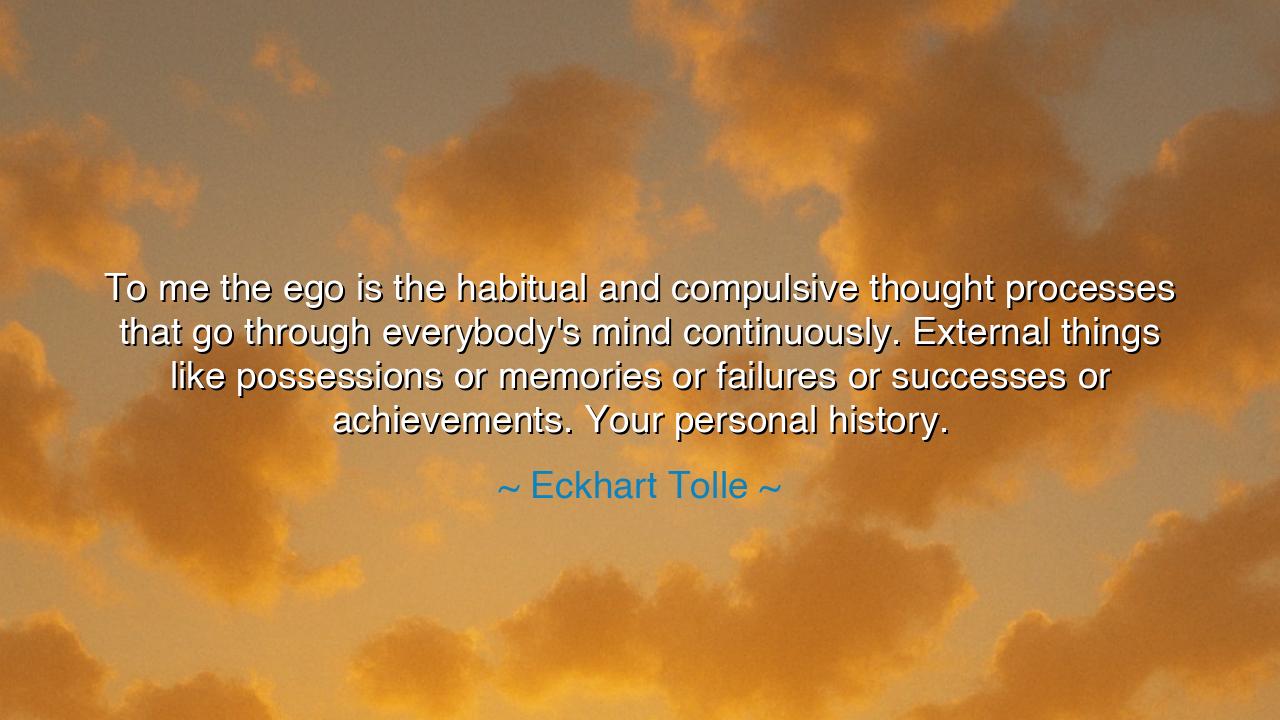
To me the ego is the habitual and compulsive thought processes
To me the ego is the habitual and compulsive thought processes that go through everybody's mind continuously. External things like possessions or memories or failures or successes or achievements. Your personal history.






The spiritual teacher Eckhart Tolle, whose words have guided countless seekers toward stillness, once explained: “To me the ego is the habitual and compulsive thought processes that go through everybody's mind continuously. External things like possessions or memories or failures or successes or achievements. Your personal history.” These words, though spoken softly, strike at the very heart of human suffering. They unmask the ego, not as a monster outside of us, but as a quiet whisper within—a ceaseless tide of thought and identity that separates us from peace. In his insight, Tolle reminds us that what we call “self” is often nothing more than a storm of memory and comparison, and that true freedom lies beyond this tempest, in the stillness of presence.
When Tolle speaks of the ego as “habitual and compulsive thought processes,” he unveils the prison most do not even know they inhabit. The mind repeats its patterns endlessly—judging, desiring, fearing, recalling—and from these thoughts we weave a false self, a story we mistake for reality. We say, “I am my achievements,” or “I am my failures.” We cling to our past as identity and project our future as destiny. Yet beneath these shifting clouds lies the sky of consciousness itself—unchanging, eternal, vast. The ego is the veil that obscures that sky. It feeds on attention and comparison; it lives through separation. To awaken, then, is to see the ego for what it is: a collection of thoughts pretending to be you.
The origin of this insight arises from Tolle’s own awakening. As a young man, he suffered from deep despair and anxiety, trapped within the tyranny of his own mind. One night, as he sat in anguish, he heard the words within himself: “I cannot live with myself any longer.” In that moment, a question arose—Who is the ‘I’ that cannot live with ‘myself’? The illusion shattered. He saw that there were two—the observing consciousness and the noisy mind—and that only one was real. In the silence that followed, his ego dissolved, and he awoke into profound peace. From this experience came his teachings, and from his teachings came this quote: a reminder that what we call “I” is often the echo of habit, not the truth of being.
The ancients, too, understood this struggle. In the Upanishads, the sages taught that the Atman—the true Self—is not the body, nor the mind, nor the memories, but pure awareness. Buddha spoke of anatta, the “no-self,” teaching that attachment to identity is the root of suffering. Even the Stoic philosophers, like Marcus Aurelius, warned that pride in wealth or fame is nothing but bondage to the external. Across ages and cultures, the same wisdom emerges: the ego is not the self, but a mask, and it crumbles the moment we cease to feed it with thought.
Consider the tale of the emperor Ashoka of India. Once a ruthless conqueror, he sought meaning in blood and victory. But after witnessing the carnage of Kalinga, he was struck by emptiness. The power he had pursued was hollow; the identity he had built was illusion. He turned to the teachings of the Buddha and found peace not in the expansion of empire, but in the conquest of the self. Ashoka’s transformation mirrors Tolle’s message: that the truest victory is not over the world, but over the mind’s attachment to the world.
To see the ego, then, is the beginning of liberation. You do not destroy it by force; you outgrow it through awareness. Every moment you observe your thoughts without identifying with them, you weaken the grip of the false self. When anger arises and you watch it without acting, when pride swells and you smile at its vanity, when regret stirs and you simply let it pass—you are reclaiming the throne of consciousness. The ego, deprived of attention, fades like a shadow in sunlight.
So, my child, remember this teaching: you are not your story. You are not your possessions, your failures, or your triumphs. You are the stillness that watches them come and go. The house of the ego is built upon sand; the dwelling of the soul stands upon the rock of awareness. Do not live chained to the noise of thought. Sit in silence each day, breathe, and listen—not to the mind’s chatter, but to the quiet presence beneath it. In that stillness, the ancient truth will reveal itself: that you have never been lost, only dreaming of separation. And when you awaken, as Eckhart Tolle did, you will find that what you sought was never outside you—it was the peace that has been waiting within you all along.






AAdministratorAdministrator
Welcome, honored guests. Please leave a comment, we will respond soon